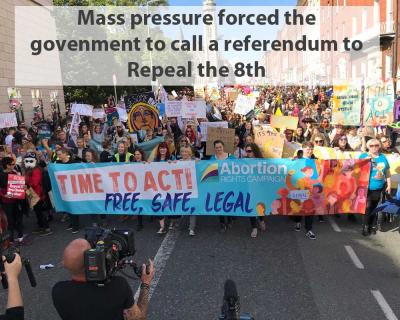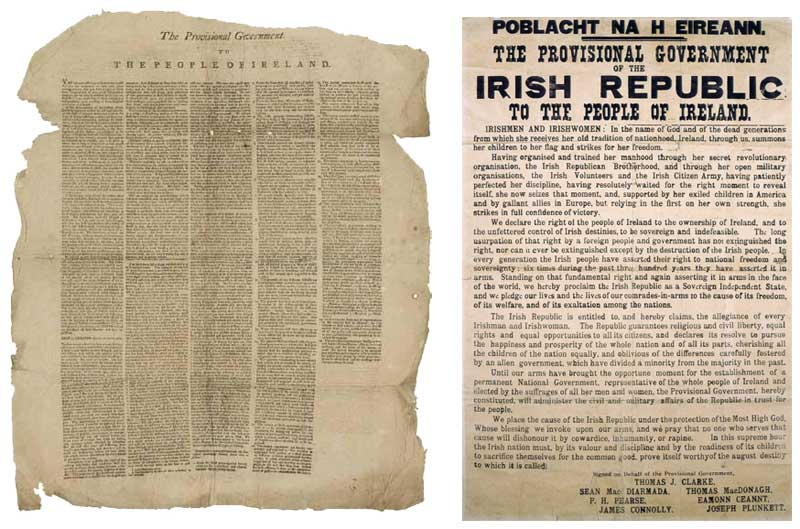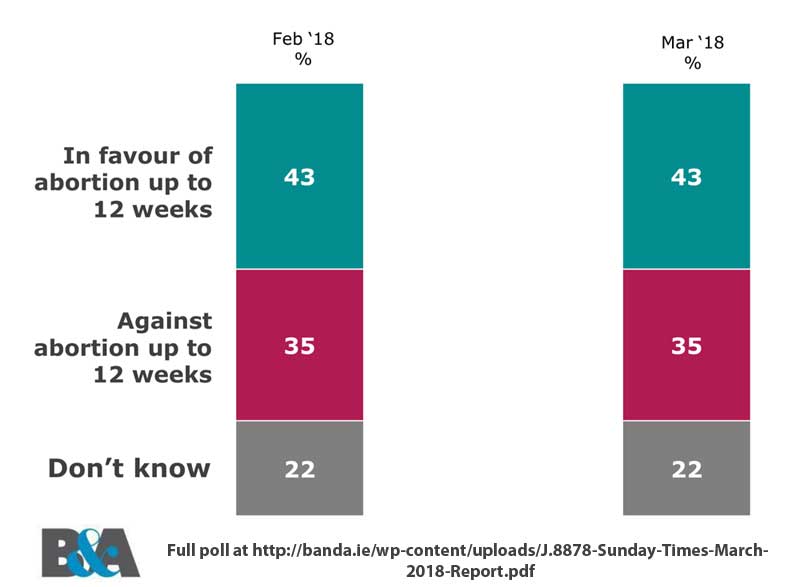Over 30 years of anarchist writing from Ireland listed under hundreds of topics
Opinion
Distrust politicians? - Vote for Repeal because we forced them to call the referendum, we are the rebellion
 One of the more bizarre elements of the pro-choice referendum in Ireland has been the attempt by anti-choice campaigners to portray themselves as rebels. This while defending a 35 year old ban on abortion that was introduced to copper fasten the status quo back then. This is providing something of an excuse however for some characters on the left (generally men) to adopt anti women positions on the basis that the 'establishment' is now backing change. A couple of our members take this argument apart below.
One of the more bizarre elements of the pro-choice referendum in Ireland has been the attempt by anti-choice campaigners to portray themselves as rebels. This while defending a 35 year old ban on abortion that was introduced to copper fasten the status quo back then. This is providing something of an excuse however for some characters on the left (generally men) to adopt anti women positions on the basis that the 'establishment' is now backing change. A couple of our members take this argument apart below.
Trusting politicians does not come easy - distrust comes far easier. In the fight for votes in the Repeal referendum the issue of distrusting politicians has been raised by the anti-choice side. Politicians do have poor track record, tending to leave a litany of broken promises in their wake. We all remember different promises broken - I remember the one about ‘ to protect the vulnerable’ when this battered ship sailed into the storm of austerity. In Ireland, even politicians say things like ‘you can’t trust politicians’. It as if by saying that they are exempting themselves from being politicians, and saying, you can trust us again.
Trust and distrust are flip sides of a coin. The answer you give frequently depends on this. Are you dancing? Who is asking? On the bottom of some No posters it says 'join the rebellion’. There is a gross twisting of the truth going on here. It can be compared with Darth Vader stretching out his gloved hand and asking you to join the rebellion. Essentially it is the empire of misogyny doing everything in its power to gain a single no vote. Their mind trick here is that if the Government want you to vote for something that you should vote the other way. It hinges on the inherent distrust factor.
A trip into the anti-choice mind
You'd be hard pressed to find an issue riddled with as many lies, myths, inaccuracies etc. as abortion particularly in Ireland. You'd also be hard pressed to find a more ridiculous poster as that which some members of the anti-choice brigade have produced in the run up to referendum.
How the government were forced to call a referendum to repeal the 8th
 Now that we have a definitive date of May 25th 2018, the date on which we will get to vote to repeal the 8th Amendment it is timely for us to remember how this opportunity to change Irish society into a fairer one came about.
Now that we have a definitive date of May 25th 2018, the date on which we will get to vote to repeal the 8th Amendment it is timely for us to remember how this opportunity to change Irish society into a fairer one came about.
History is written by those in power, therefore this referendum has comes with a heavily constructed backstory that goes like this. Leo Varadkar, our funky sock wearing leader, with all his social media savvy got together with his wing of the Fine Gael party to progress social change in Ireland. Repeal was the next obvious step. The line continues that having witnessed the historic popular vote on the marriage equality referendum, the government decided to tackle the thorny issue of the 8th amendment. They had not the courage to devise a plan themselves so they gave it to the Citizens assembly, hoping that if they came back with something grossly unpopular then it was the assembly that could be blamed. I diverge from the script here, but it is important to recognise that there is a distinct lack of courage with the elected ones. Now, they are now fully enacting the recommendations, because the Citizens assembly came back with the obvious solution to deal with the issue. That was to repeal the 8th amendment and legislate for safe abortion in Ireland.
The Fenian Proclamation (1867) vs the 1916 Proclamation - the lost radicalism of Irish republicanism
 Considering the fact the Anarchist Communism as a coherent and easily transmutable ideology only came to be during the 1870’s and 1880’s the Fenian Proclamation of 1867 is striking in its progressiveness and clarity of thought. A product of the Irish Famine, English economic and military Imperialism in Ireland and a tradition of insurrectionary attempts against Imperialist rule, the original Fenians of 1867 should be viewed as proto socialistic in their values and analysis.
Considering the fact the Anarchist Communism as a coherent and easily transmutable ideology only came to be during the 1870’s and 1880’s the Fenian Proclamation of 1867 is striking in its progressiveness and clarity of thought. A product of the Irish Famine, English economic and military Imperialism in Ireland and a tradition of insurrectionary attempts against Imperialist rule, the original Fenians of 1867 should be viewed as proto socialistic in their values and analysis.
This is not to say they were Anarchists or close, they were most definitely Republican statists, who organised for an almost purely military strike against Imperialism, as opposed to the destruction of the state and working class/farmer self-activity for the destruction of exploitation and Imperialism and the creation of a cooperative society.
Repealing the 8th - what the opinion polls are telling us
 The Sunday Times with Behaviour & Attitudes have run two very useful polls that give a strong sense of how the campaign to Repeal the 8th Referendum is going. The overall story the poll results tell is bad for the Vote No campaign and promising for the Vote Yes campaign. If the referendum had been held at the time of the March poll then Repeal would have been carried by 64% to 36%, almost 2:1. The polling data also shows No has a soft vote that is very much larger proportion than the equivalent soft Yes vote. This means if anything between now and referendum day the polls are likely to drift towards repeal.
The Sunday Times with Behaviour & Attitudes have run two very useful polls that give a strong sense of how the campaign to Repeal the 8th Referendum is going. The overall story the poll results tell is bad for the Vote No campaign and promising for the Vote Yes campaign. If the referendum had been held at the time of the March poll then Repeal would have been carried by 64% to 36%, almost 2:1. The polling data also shows No has a soft vote that is very much larger proportion than the equivalent soft Yes vote. This means if anything between now and referendum day the polls are likely to drift towards repeal.
None of this is a reason for complacency, what the No side lacks in terms of numbers and support they make up for in terms of funding. Before the campaign had even started they were spending hundreds of thousands on online advertising, billboards, leaflets and free buses to what had to be their disappointingly small March 10th national march. Together for Yes may have far more support and more people out canvassing but will it have enough to defeat all that paid advertising?
As this is a long read we are also making an audio version available
The Turkish invasion of Afrin
 This is a collection of four pieces we wrote during the Turkish invasion of Afrin and the two month defence of the tiny canton against NATOs second biggest army. A desperate struggle in which almost 900 SDF fighters were killed by Turkish airpower and military trying to defend the Rojava revolution. These reports were originally published on our Facebook page and are presented here as published.
This is a collection of four pieces we wrote during the Turkish invasion of Afrin and the two month defence of the tiny canton against NATOs second biggest army. A desperate struggle in which almost 900 SDF fighters were killed by Turkish airpower and military trying to defend the Rojava revolution. These reports were originally published on our Facebook page and are presented here as published.
Climate Change, Peak Oil, and Globalisation - 3 Interlinked Problems
There are problems which are related but not very often discussed together. These are 1) climate change and pollution, 2) peak oil, and 3) globalisation - very large and complex problems which though not insurmountable require serious consideration.

What the author writes here is simplifying reality as the main purpose is to provoke thought in the reader and encourage further research.
Union Struggle: How the Minions Fought and Won Against GRU
In 2015, 2 years after graduating from an animation school in Paris, I found myself participating for the first time in a struggle as a unionised worker. At the time my interest in the anarchist critique of our current institutions was increasing, but having no first hand experience of class struggle, I couldn’t relate to what anarchism had to say about unions. By telling the story of this fight, I hope to show how much can be learnt from a single campaign and why action is the best way to assimilate theory and perfect it. I also hope that the specifics of this story will be a useful addition to the wealth of past experiences anarchists can learn from.
PESCO and The Militarisation of the EU
The idea that the European Union is an undemocratic entity has become unremarkable, yet its latest authoritarian move shouldn’t be overlooked since the negative consequences will be felt both in Europe and abroad.
On the 11th of December 2017 the European council decided to establish a European military command structure under the acronym of PESCO (Permanent Structured Cooperation). This happened only a month after EU member states issued a statement about their intention to participate in this European defence cooperation. The speed of the process and the signing up of countries with neutrality policies such as Ireland, Sweden, and Austria raises a red flag. In Ireland, the decision to be part of PESCO happened after a rushed debate and was in direct violation of Ireland’s neutrality stance. On top of this, one interpretation of the 6th article of the Irish constitution implies that any delegation of power to the EU should be put to a referendum.
So why has PESCO suddenly become a priority? What is the geopolitical meaning of this move and what exactly does PESCO entail?
Thinking About Anarchism: Hierarchy - What it is and isn't
Wondering why your vote doesn’t seem to make a difference, why your wages seem to barely cover your costs, or why you feel like a second-class citizen? Then, you’re thinking about hierarchy.
 Anarchists treat ‘hierarchy’ as the central issue in society, as the unifying theme in most of the problems we face. Then, the aim is to get rid of hierarchy and replace it with something better. But what is hierarchy? It’s not something which is talked about in mainstream political discourse, and even anarchists themselves can sometimes misunderstand it.
Anarchists treat ‘hierarchy’ as the central issue in society, as the unifying theme in most of the problems we face. Then, the aim is to get rid of hierarchy and replace it with something better. But what is hierarchy? It’s not something which is talked about in mainstream political discourse, and even anarchists themselves can sometimes misunderstand it.

